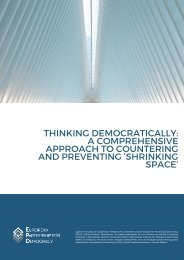Repression and resilience: Diagnosing closing space mid-pandemic
You also want an ePaper? Increase the reach of your titles
YUMPU automatically turns print PDFs into web optimized ePapers that Google loves.
16 REPRESSION AND RESILIENCE: DIAGNOSING CLOSING SPACE MID-PANDEMIC<br />
Keeping the executive in check – oversight<br />
<strong>and</strong> rule by decree<br />
While states of emergency can be necessary for quick<br />
<strong>and</strong> effective action to curb emergencies such as a<br />
global p<strong>and</strong>emic, in a democracy a state of emergency<br />
needs to be temporary <strong>and</strong> guided by the principle of<br />
proportionality. 32 Restrictions taken to respond to an<br />
emergency must be publicly justified by legitimate public<br />
goals. 33 A state of emergency allows governments to limit<br />
certain civil liberties <strong>and</strong> pass legislation more quickly<br />
<strong>and</strong> less transparently, due to limited oversight from<br />
parliamentary institutions <strong>and</strong> other watchdogs. 34 This<br />
creates opportunities for abuse, which was observed in<br />
half of the case studies, namely Indonesia, Guatemala,<br />
Colombia <strong>and</strong> Venezuela. The cases of Colombia <strong>and</strong><br />
Venezuela are most telling of what the abuse of limited<br />
oversight could practically result in.<br />
The case studies showed how states of emergency<br />
have been used to quickly pass laws at a time of limited<br />
oversight, in such high numbers that it was impossible for<br />
either the legislative or the judiciary branch to properly<br />
oversee the legislation. A telling example is the case of<br />
Colombia, where 72 decrees <strong>and</strong> laws <strong>and</strong> dozens of<br />
resolutions <strong>and</strong> administrative acts were passed in the<br />
first month of the p<strong>and</strong>emic. These covered economic,<br />
tax, civil, labour <strong>and</strong> criminal matters, some directly<br />
related to the p<strong>and</strong>emic response, but others completely<br />
unrelated. For instance, a constitutional reform to allow<br />
for life imprisonment for child rapists was adopted under<br />
the state of emergency in Colombia. This had no relation<br />
to the p<strong>and</strong>emic <strong>and</strong> would not have been possible to<br />
adopt if following regular legislative procedures, as the<br />
wider public is generally opposed to life imprisonment.<br />
As the researcher put it, “through the state of emergency<br />
declared due to the epidemic, the government has found<br />
a way to accumulate power to override Congress <strong>and</strong><br />
the courts, <strong>and</strong> its ultimate goal seems to be the use of<br />
this newfound power to weaken the peace accords <strong>and</strong><br />
their implementation.”<br />
While Venezuela had been in a state of emergency since<br />
2016, the p<strong>and</strong>emic gave the excuse to further enhance<br />
the emergency powers of the executive. Within this time<br />
of reduced oversight, an NGO law limiting NGO <strong>and</strong><br />
humanitarian organisations’ ability to register <strong>and</strong> receive<br />
foreign funding was adopted. Even more troubling is the<br />
Supreme Court intervention which rendered the existing<br />
electoral law void, creating a new paralegal framework<br />
for the 2021 legislative elections. The national elite<br />
thereby completely skewed the playing field in favour of<br />
the ruling party with an increased number of deputies, a<br />
redistribution of seats per state, <strong>and</strong> by dismantling the<br />
system of indigenous peoples’ representation. 35 While it is<br />
not inconceivable that the ruling elite would have made<br />
this move regardless of the p<strong>and</strong>emic, the p<strong>and</strong>emic<br />
allowed for an accelerated passage of decisions which<br />
prevented the public or opposition groups from opposing<br />
such decisions.<br />
That being said, not all governments used the state<br />
of emergency <strong>and</strong> limited oversight to push through<br />
repressive legislation. In Guatemala, for instance, a<br />
package of repressive laws that would have undermined<br />
civil liberties was tabled in parliament prior to the<br />
p<strong>and</strong>emic, but was not pushed through during the<br />
p<strong>and</strong>emic itself. In Honduras, a number of rights<br />
restrictions considered to be disproportionate - such as<br />
restrictions on freedom of expression, association, 24-<br />
hour detention <strong>and</strong> bail - were initially passed under the<br />
state of emergency. These measures, however, were<br />
overturned upon pressure from the judiciary <strong>and</strong> civil<br />
society. The way the state of emergency was used thus<br />
32 European Partnership for Democracy (2020): Joint statement: Democratic principles in a time of crisis. Available here.<br />
33 OHCHR (2020): Press release: COVID-19: States should not abuse emergency measures to suppress human rights. Available here.<br />
34 Open Government Partnership (2020): Statement on the COVID-19 response from civil society members of OGP Steering Committee.<br />
Available here.<br />
35 Abdul, R. et al. (2020): Misión de estudio IDEA Internacional-UCAB sobre las condiciones del proceso electoral parlamentario 2020 en<br />
Venezuela - Resumen. Available here.

















